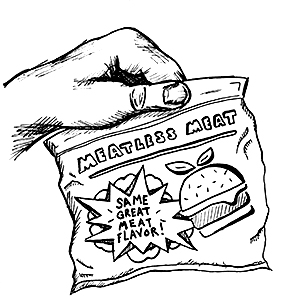“Impossible Burgers” were made only for meat eaters
February 20, 2020
Recently, plant-based meat substitutes that mimic the taste and texture of meat have popped up in grocery stores, nice restaurants and fast food chains.
As a vegetarian, I am thrilled that plant-based foods are becoming more accessible. But I wish the veggie options didn’t taste like real meat.
Plant-based meat substitutes are not for vegetarians and vegans, they are for meat eaters.
The founder of Impossible Foods, one of the biggest producers of fake meat, said he has zero interest in vegetarian customers according to an October 2017 Vox article. Yet their products are being marketed towards us.
I don’t want to eat meat, real or imitation. I’m often disappointed when I go to a restaurant and the menu is meat heavy. Not because I can’t eat meat, but that there isn’t a meatless option.
There are two main brands that make this type of meat substitute, Beyond Meat and Impossible Foods.
Beyond Meat started selling imitation chicken in 2013 and imitation beef in 2014. Impossible Foods launched their signature burger in 2016.
In the following years, these brands became very successful, according to a December 2019 New York Times article.
In 2018 they reached mainstream success when Beyond Meat made their first major restaurant partnership with fast food restaurant company A&W.
Since their introduction, there have been multiple instances where I’ve gone to restaurants that replaced their homemade veggie burgers with commercially produced imitation meat.
I don’t know why they made the switch. But if it was for vegetarians, I don’t think they consulted any.
I live with two other vegetarians and both would rather have a vegetable-based dish than one centered around imitation meat.
My vegetarian mom and I were at dinner together the first time we encountered Beyond Meat. When we asked the waitress if it tasted like real meat, she told us it tastes just like normal meat and we shouldn’t let the fact that it’s plant based stop us from ordering it.
Neither of us remember what meat tastes like. My mom hasn’t eaten meat since before she had kids, and I haven’t had meat since fourth grade.
Something tasting just like meat will make us less likely to order it.
I’m sure that for new vegetarians and vegans or people trying to cut back on their meat consumption for environmental reasons, these foods are great.
But just because they might be better for the environment than traditional meat doesn’t make them perfect.
Randall’s Beans, a bean company, compared their burgers with Impossible burgers. Their bean based burgers are less than half the calories, a fraction of the fat and double the fiber of an Impossible Burger, according to a November 2019 post on their website.
Additionally, the ingredients in veggie burgers tend to be vegetables, lentils and beans according to a July 2013 Food Network article. Imitation meat isn’t made of vegetables but wheat or soy protein with a genetically engineered yeast.
I don’t see anything morally wrong with meat consumption. I actually am in favor of local ethically and humanely raised and slaughtered meat.
Not everyone is capable of a vegetarian or vegan lifestyle, and even if a person is capable of giving up animal products, they shouldn’t be required to.
My problem lies in the fact that meat consumption is presumed to the point of having meatless options resemble real meat as closely as possible. Vegetables taste good.
If I wanted to eat meat, I wouldn’t be vegetarian.







